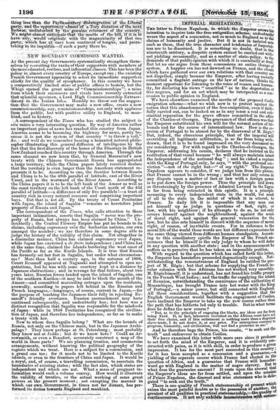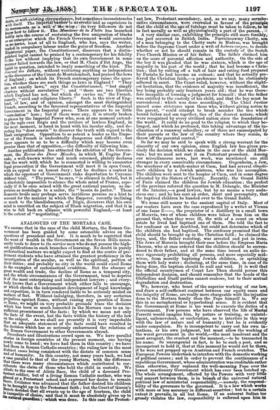-1,0441.1 i817,9 II • b , 40N_ osr TILE letter
to Prince Napoleon, in which the fEraperior avuwirliie intention to inquire into the free emigration scheme =doubts* wears the aspect of 'a concession, not so much to England as ea thei claims of humanity and justice. But it is not in isolated seta such as these, that the true character and tendencies of Imperjal. ism arc' to be discerned. It is something no doubt, that m this
. nineteenth century, a despotic system cannot be carried out with.
out yielding occasionally, and as a matter of state-policy, to the demands of that public opinion with which it is essentially at feud. But let no one argue from these concessions an entire change of system. A happier era has not dawnedion France, and the clouds which have gathered over our own relatians with that weary are not dispelled, simply because the Emperor, ' after having reeeonv committed a flagrant outrage on the law of nations, thinks tge moment opportune for listening to the voice of reason and human. ity, for declaring his views " unsettled " as to the--deportation of free negroes, and for an act which may be interpreted as a con. cession to public opinion in England.' We have elsewhere 'examined the merits of the proposed coolie emigration scheme—what we wish now is to protest against the notion that this abandonment of the free emigration, even if faith- fully carried out, can be looked on as in any sense a real and sub- stantial reparation for the grave offence committed in the affair of the Charles-et-Georges. The gravamen of that offence was that the Emperor substituted his own will for the ncirmal action of tri. bunals and for the course of international law. How is the co- ercion of Portugal to be atoned for by the disavowal of l!d. Woo, But, indeed, the obnoxious principle, that of the imperial will overriding till legitimate arbitration, is so far from being with. drawn, that it is to be found impressed on the very document we are considering. For with regard to the Charles-et-Georges, the Emperor, addressing his cousin, declares that he insisted on the restitution of that vessel because "he will always maintain haat the independence of the national flag " ; and he iisked a rupture with the King of Portugal only, he says, "with the profound con- viction "—not of the right but—" of my right.". The Emperor Napoleon appears to consider, if we judge him from this phrase, that France cannot be in the wrong ; and that her only course in any dispute upon a matter of fact or law with a foreign power is to put down the foreign power. Thus the principle laid down so threateningly by the presence of Admiral Lavaud in the Tagus is far from being retracted in this epistle. It is a principle menacing to every independent state in the world, but most of all to the state in the midst of which it is uttered, to France. In daily life it is impossible that any man can set himself up as judge in questions of fact, right, or law, with his neighbour; if he attempts to do so, he not only arrays himself against the neighbourhood, against the sense of moral right, and against the general veneration for the law, but he also sets himself in discord with the sequence of moral right, of reason, of inevitable events. FOR in reference to the moral life of the world those words are but different expressions for the same thing viewed from different human standpoints. Accord- ing to this conciliatory epistle the Emperor of the French an- nounces that he himself is the only judge to whom he will defer in any question with another state ; and in the announcement he suffers us to perceive that he has taken an impossible position.
With regard to the question which has called forth this letter, the Emperor has heretofore proceeded dogmatically enough. Not- withstanding the remonstrances of England he ratified the pro- ject of N. Regis ; but that scheme for supplying the French in- sular colonies with free Africans has not worked very smoothly. M. Regishimself, it is understood, has not found his traffic prosper in the French West Indies ; and the traffic for supplying the island of Reunion, notwithstanding the connivance of the authorities at Mozambique, has brought France into hot water with the King of Portugal,—a minor power, but still connected with England. All these considerations, together with a suggestion that the English Government would facilitate the engagement of Coolies, have inclined the Emperor to take up the new course rather than the path that has hitherto led only to trouble. But in what terms does he define the new course? "But as to the principle of engaging the blacks, my ideas are far from being fixed. If, in fact, labourers recruited on the African coast have not their free choice, and if this enlistment is nothing more than a disguised slave-trade, I do not desire it, at any price. For enterprises contrary to progress, humanity, and civilization, will not find a protector in me."
And he therefore begs the Prince, his COUBLII, "to seek out the truth" and endeavour to obtain Coolies. We have examined this letter with more care since it professes to set forth the mind of the Emperor, and it is evidently con- structed. with pains, as it is with skill, in order to produce a given impression. It has for the most part succeeded in this country, 1
for it has been accepted as a concession and a
yielding of the separate course which France had el=tee,-- in _the question of Africa, and a guarantee that France will hencefor- ward go with England in the matter of n.egro slavery. But_t0 what does the guarantee amount? It rests upon the avowal t?sfi the Emperor's ideas are far from settled, and upon the mismo of Prince Napoleon, the discreet and wise statesman who is dele- gated "to seek out the truth."
There is one quality of French statesmanship at present whit1 raises the most painful doubts as to the possession of another, ts.. greatest of all qualities in practical statesmanship,—the quality a - continuonsness, It not ply:exhibits inconsistencies with antece
s, but sp es inconsistencies eer-vrith exi 4 In• Ole :I
• ,h itself. The „ , • s er.re c . .d as capricious in .•. 14 ovements saecia will' o' 'thetirisp ; its Very followers-db not itsl
boat ta follow it. The liforeiteur de la Flotte has launched *01; late the course of sustaining the free emigration of blacks
3.1 anlenterprise which the French Government would surrender 04,0 4eains, least of all to England, who has, says the writer, wide& in compulsory labour under the guise of freedom. Another ginisterial paper, the Constitutionnel, discovers that a distill- gtas' bed legist cannot be praised by a contemporary for his fidelity td the law without implying that its own Government in some manner failed towards the law, or that M. Chain d'Est Ange, the kgist in question, intended to imply something of the kind. The Journal des Baas, without venturing anything so independent as the discourse of the Count de Montalembert, had praised the laws of England ; on which its 'Freneh contemporary raises the ques- tion, whether there are such things as laws in England ? "they are not exactly laws," says the Coustitutionnel, "but simply charters Without correlation " ; and "there are two liberties which England has not, but which she envies us," the French, namely; "civil and religions liberty." Such is the view of Eng- land, of law, and of opinion, amongst the most distinguished French, according to the favoured representatives of the Imperial Government in the Imperial press. There appears to us little "correlation" here ; but if there were any, it is utterly broken to pieties by the Imperial Power who, seen at one moment extend- ing-the tegas over Regis and the revilers of lawless England, in the next moment, is hand in hand with his insular ally, and de- puting his "dear cousin" to discover the truth with regard to the black emigration. Opposition to so potent a leader as the Empe- ror of the French is undoubtedly dangerous and difficult ; but there aprs to us to be a difficulty which may become even greater that of opposition -the difficulty of following him. Another publication has attracted the attention of the Govern- ment, the Revue des Dean Ilfondes, in which M. Eugene For
' -
ced? a well-known writer and. Much esteemed, plainly declares that the work with which he is connected is willing to encounter legal prosecution if the Government will meet it in open Court, with an appeal to an honest Jury;. but he declines a contest in which the opponent of Government risks deportation to Cayenne without trial. "The press," he says, "is silenced in detail, but it is absolutely impossible to silence the whole mind of France, espe- cially if it be once seized with the great national passion, as im- perious as nostolagia to a sailor, the "bosom de parler." These aomestic broils may perhaps serve invidious persons as a hint to account for the manner in which the Emperor, recently inclining so much to the blandishments, of Regis, discovers that his own mind is unsettled on the subject of Black migration and that it ie wise to fall back on alliance with powerful England,-at least to the extent of "negotiating."



























 Previous page
Previous page